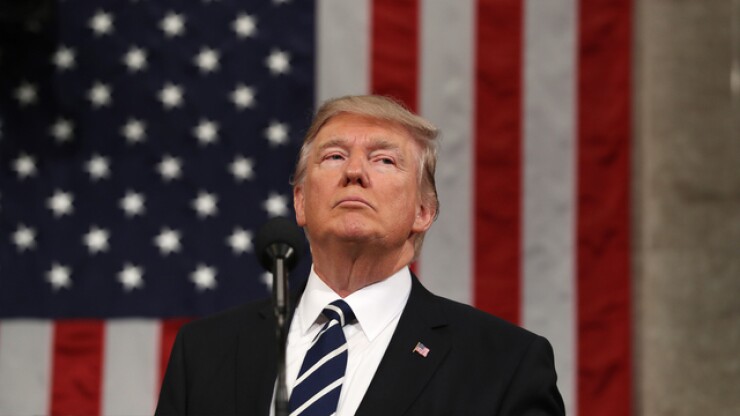(Bloomberg) Leaked pages of President Donald Trump’s 2005 tax return offer no new details about his foreign income and business dealings but highlight a tax he’s vowed to abolish.
The alternative minimum tax, or AMT, was responsible for 80 percent of Trump’s 2005 federal income tax bill of $38.4 million, on income of $152.7 million. That’s a “startlingly” large proportion, said Alexander Popovich, a wealth adviser at JPMorgan Chase & Co.’s private bank. “It’s very strange—usually, the AMT is not going to cause anywhere near such a difference,” Popovich said.

Trump has contravened 40 years of tradition by declining to release his tax returns, so the two pages of his 2005 return, which veteran tax journalist David Cay Johnston presented on MSNBC’s “The Rachel Maddow Show” Tuesday, offer a rare—but limited—peek into the president’s finances. Among the items on view: Trump got hit with a tax that in recent years has affected increasing numbers of well-off, but not necessarily wealthy, Americans.
The AMT was introduced to taxpayers in 1970 as a way to prevent high-earning households from winnowing down or zeroing out their federal income-tax bills. The tax works by taking away personal and dependent exemptions, as well as various itemized deductions, including those for state and local taxes. Other deductions are capped. It’s triggered by almost two dozen factors, including losses, depreciation, stock options and exemptions for children.
State Taxes
As inflation boosted incomes, the AMT has captured a larger number of taxpayers—including roughly 30 percent of households with cash income between $200,000 and $500,000, according to the Urban-Brookings Tax Policy Center, a Washington-based policy group. Higher state and local taxes in states like California, New York, New Jersey and Massachusetts—which can’t be deducted under the AMT—have helped stir complaints about the tax.
Trump and House Republicans have both formally called for abolishing it as part of their planned tax overhaul. The tax will raise about $35 billion this year, about 2.2 percent of all individual income tax revenue, according to the Tax Policy Center.
“The AMT created this incredibly complicated formula to try to compensate for all of the deductions that are built in on the other side of the tax piece,” Senator James Lankford, an Oklahoma Republican, said Wednesday.
Democrats are wary of scrapping it. “I’m an advocate of the AMT,” New York Senator Chuck Schumer, the Democratic leader, said.
It’s unclear what caused Trump to have to pay the AMT. The large bill “raises more questions than it answers,” said Leonard Burman, co-founder of the Tax Policy Center. “For the vast majority of people, the AMT is only a portion of their tax liability—just a supplement to their regular taxes.”
Trump’s Documents
The leaked documents show that Trump and his wife, Melania, paid $5.3 million in federal income tax and more than $31 million in AMT. The combined $38.4 million tax bill gave the Trumps a federal tax rate of about 25 percent. It’s not clear that absent the AMT, they would have paid only a 3.5 percent rate, because of differences in the way deductions are treated by the AMT and regular income tax.
It’s unusual that the Trumps were caught by a tax that predominantly hits earners in the $400,000 to $1.2 million gross income range, said Popovich of JPMorgan Chase. Far wealthier taxpayers can typically avoid its effects because capital gains income—a mainstay for the top 0.1 percent—largely escapes the AMT.
Chuck Collins, a scholar at the left-leaning Institute for Policy Studies, said he assumed that a reported loss of $103 million on Trump’s 2005 return, combined with depreciation for real estate, “probably” triggered the alternative levy. “The AMT tends to catch people who have paper losses,” he said.
Depreciation Cited
In a statement released Tuesday night before the MSNBC broadcast, the White House cited a “large-scale depreciation for construction,” but didn’t elaborate.
Burman said the loss may have been carried over from 1995, when Trump reported a $916 million loss on his New York state tax return, according to documents that were leaked to the New York Times last October.
Taxpayers are allowed to “carry forward” losses that they can’t fully use in a given year because they don’t have enough taxable income. Bloomberg reported in October that the $916 million loss probably stemmed from Trump’s use of a now-banished tax provision that allowed investors to turn canceled debt into personal losses for the purposes of reducing their federal tax bills.
“Whoever leaked the two pages didn’t release the supporting schedules to the return, which would show how and why the AMT was triggered,” Burman said. “There could be things on the full tax return that might tell us something about the nature and structure of his businesses and income that triggered the tax.”
Prior Year
However, the two pages from 2005 may well provide a clue about something else: Trump’s federal tax bill for 2004. The document lists estimated tax payments of $13,291,993 that Trump made in 2005—and under federal rules in place at the time, those payments had to total 110 percent of his 2004 tax liability.
That means Trump probably had a federal tax liability of roughly $12.1 million in 2004, according to Matthew Morris, a tax attorney at law firm Bowditch & Dewey LLP, who reviewed the 2005 document and made the calculations. It’s also possible that the estimated tax payments were overpayments, but that seems unlikely, Morris said.
- With assistance from Sahil Kapur





